- Home
- Niccolò Ammaniti
Anna Page 5
Anna Read online
Page 5
One day, after walking backwards and forwards, she’d pushed the glass door open. A bell had rung. Inside, it was just like when she used to shop there with her mother on the way back from the beach. The food on the shelves, the panettone on special offer, the display case with the radios and razors for card-holders. Only the cheese and cold meat counter was empty and there were no crates of vegetables.
Anna had wandered around the shop as if in a dream. If she’d reached out her hand, the jars, boxes of cereal and bottles of balsamic vinegar would surely have vanished.
‘Can we help you?’
The twins were standing side by side, in their tracksuits and white shoes. One was holding a shotgun.
‘Would you like a trolley?’
Anna gestured that she wouldn’t.
‘We’ve got everything, including Easter eggs with a surprise, and Nutella,’ the one with the shotgun had explained.
Nutella was very hard to find. It had been one of the first things to disappear after the epidemic.
Anna had looked around. ‘Ferrero Rocher, too?’
‘Certainly.’
‘How do I pay you? With money?’ But she knew the world was full of money and nobody cared about it.
‘We swap things. Have you got anything to swap?’
She’d searched in her trouser pockets. ‘I’ve got a Swiss knife.’
The two teddy bears had shaken their heads in unison. ‘We’re interested in batteries, but only if they have some charge left – we check them. We’re also interested in medicines and Massimo Ranieri CDs.’
Anna had raised an eyebrow. ‘Who’s Massimo Ranieri?’
‘A famous singer. Our father used to like him,’ the one with the shotgun had replied. ‘In exchange for him we can give you three large jars of Nutella or six small Toblerones. Everything you see in here can be swapped. It’s a mini-market.’
Anna had never heard the twins utter so many words in succession.
Over the next few months, wherever she went, she looked for Massimo Ranieri CDs. There was plenty of Vasco Rossi and Lucio Battisti, but no Ranieri. Then one day, in an autostrada service area, she’d found, among mobile phone cases, deodorants and sodden books, a triple album titled Naples and My Songs.
That would buy her the antibiotics.
*
She’d gone the wrong way. There was a shorter route to the twins’ shop and yet, as if her feet had made their own decision, she’d found herself on the autostrada.
The car with the dog in it was there.
Anna stared at the open door, biting her thumbnail. She wanted to see him before the crows left nothing but bones.
She drew the knife from her rucksack, went up to the car and peered inside. A patch of dirty hair. She screamed; there was no reaction. Leaning further in, she saw the dog through the gap between the front seats. In the same position as when she’d left him. The blood had dried below the neck and the back seat was soaked in it. Big metallic grey flies settling. Tongue hanging out of the open mouth, over dark gums covered in drool. One visible eye, as big as a biscuit and as black as diesel, wide open, staring into the void. Breathing so faint it was barely audible. Tail limp between the back legs, twitching slightly.
Anna touched him on the side with the tip of the knife. No movement of the body, but the pupil shifted, focusing on her for a moment.
As if he was looking forward to death. It happened to all dying creatures, human beings and animals.
In the past four years Anna had seen many children become covered with blotches and fade away. Slumped in a dark recess under the stairs, in a car like this dog, under a tree or in a bed. They would put up a fight, but eventually they would all, without exception, realise it was over, as if death itself had whispered it in their ear. Some kept going for a little while longer with that awareness; others discovered it only a second before they died.
Anna’s hand, almost of its own accord, reached out and stroked the dog’s head.
Still motionless and indifferent, but for a moment the tail lifted and fell back down in what might almost have been a feeble wag.
Anna shook her head. ‘Aren’t you dead yet, you ugly brute?’
Among the rubbish in the gutter beside the guardrail she found a deflated plastic football. She cut it in two and got back into the car with one half. Taking the bottle out of her rucksack, she poured half its contents into the improvised dish. She held it near the dog’s mouth. At first he ignored it, then he lifted his muzzle slightly and, almost reluctantly, dipped his tongue in the water.
She pushed the dish closer. ‘Drink! Go on, drink.’
The animal gave a few more licks, then flopped down again.
Anna took a tin of peas, opened it and poured the contents out beside his mouth.
She’d done what she could.
*
Buseto Palizzolo, a small village of modern houses clustered under a hill, had also felt the effects of the fire. But the flames had only caressed the Michelinis’ Despar, blackening the walls of the building and melting the green plastic blinds on the upper floors.
Anna knocked on the shutter. ‘Open up, I want to do a swap.’ She waited a few moments. ‘Is anybody there? Can you hear me? It’s Anna Salemi, from 3C. I want to do a swap. Open up.’ Growing impatient, she walked round the building.
The tradesman’s entrance at the back was barred, and through the small grilled windows she couldn’t see a thing. Going back round to the front, she tried to lift the shutter, but it was locked. She kicked it. All those months spent searching for that stupid CD! She’d come all that way for nothing. Where was she going to find antibiotics now?
‘All right, then, I’m going. I had a Massimo Ranieri CD. It’s a really good one and I don’t think you’ve got it.’ She put her ear to the shutter.
Somebody moved inside.
‘I know you’re in there.’
‘Go away. We don’t swap things any more,’ replied a sleepy voice.
‘Not even Massimo Ranieri?’
The shutter clanked up. Out of the darkness of the shop emerged the silhouette of one of the twins. He was holding the shotgun.
Anna couldn’t tell whether he was Mario or Paolo, but one look was enough to tell her that he had Red Fever. His lips were covered with scabs and sores, his nostrils swollen and inflamed, his eyes ringed. A reddish blotch covered his neck. He might live a few more weeks. A couple of months if he was tough.
She took the CD out of her rucksack. ‘Well? Do you want it?’
The twin screwed up his eyes. ‘Let me see.’ He examined it and gave it back. ‘We’ve already got it. Anyway, I’m fed up with Massimo Ranieri. I prefer Domenico Modugno.’
Anna craned her neck to peer into the shop. ‘Are you on your own?’
The fat boy coughed, spattering a yellowish sludge on the floor. ‘My brother’s dead.’ He raised his eyes and counted silently. ‘It’s been five days now.’
Anna waited only a couple of seconds. ‘Listen, I need some medicine.’
‘I told you we don’t swap things any more.’ The twin turned round and shuffled back into the shop. She followed him.
It took her eyes a minute or two to get used to the gloom. Everything was on the floor – jars of honey and orange marmalade, dry dog food, tins of ragout, tubes of anchovy paste. A can of oil had been knocked over and shards of a broken bottle were immersed in a pool of wine.
It horrified her to see all that good food wasted. The day before she’d almost been torn apart for a few tins of beans. ‘What on earth happened?’
‘I stopped tidying up.’
‘Look, will you give me these medicines? It’s important, they’re for my brother. If you want, I’ve got some charged batteries too.’
The twin went behind the counter, rested the shotgun against the wall, flopped down on a small wicker chair, legs stretched out in front of him, arms hanging by his sides, and started coughing again. The Red Fever hadn’t succeeded in slimming him down yet.
Two sausage-like legs, white skin dotted with freckles and fair hairs, protruded from the tracksuit trousers. A spherical head sitting on rounded shoulders, without the interval of a neck.
‘I don’t need your batteries. I’ve got loads of them.’ He opened a drawer full of packets of cigarettes. ‘Would you like one?’
‘Yes, thanks.’
‘What brand do you like?’
‘Any one.’
He passed her a packet of Marlboro, together with a lighter. ‘How old’s your brother?’
Anna lit the cigarette. ‘Seven, maybe eight.’
‘It can’t be Red Fever, then.’
‘He must have eaten something rotten. He’s got a temperature and he keeps being sick. I need some antibiotics.’
The fat boy rubbed his neck. ‘Do you want to see him?’
Anna realised he meant his twin brother. ‘All right. But which one are you?’
‘Mario. Paolo was my brother.’ He led her into the area at the back of the shop, a storeroom full of cardboard boxes and crates, and a white van with the word ‘Despar’ on the side. ‘I put him here.’
Paolo lay in a big open freezer, the kind that used to be used for storing pizzas and bags of prawns. Heaped up around him were jars of tuna preserved in oil, of various makes. He was starting to swell up. The eyes had gone, sucked down inside two purple blobs. Hands like blown-up gloves. He smelled really bad.
Anna took a drag on her cigarette. ‘I bet tuna was his favourite food.’
‘And how old are you?’ Mario asked her.
‘I’ve lost count.’
He smiled, displaying small yellow teeth. ‘I remember you at school.’ He examined her. ‘Have you got the blotches?’
Anna shook her head.
‘Why do you think my brother died first? I can’t understand it – we’re twins. We were born together, we should have died together.’
‘The Red Fever comes to everyone differently. You can even catch it at fourteen.’
He nodded, pursing his lips. ‘How long do you reckon I’ve got?’
Anna stubbed the cigarette out under her sole and went up to him. She scrutinised his neck, made him lift up his T-shirt so she could see the other blotches on his back, and checked his hands. ‘I don’t know … Maybe a couple of months.’
‘That’s what I think.’ He rubbed his eye. ‘But have you heard the rumour? They say a Grown-up has survived.’
How many times had she heard such stories? Everyone she met said there were Grown-ups who’d survived somewhere or other. It was all bullshit. The virus had exterminated the Grown-ups, and as soon as children reached puberty, it killed them too. That was the truth of the matter. And after all these years she no longer believed the rumours about a vaccine. But she kept quiet, still hoping to get the antibiotics for Astor.
‘I know you don’t believe it. I didn’t either, at first. But it’s true.’ Mario put his hand on his heart.
‘What makes you so sure?’
‘The guy who told me must have been at least sixteen. Had a beard, and not a blotch on him. Said a big woman had saved him. Not a normal Grown-up, bigger. They call her “the Little Lady”. She’s three metres tall. Caught the Red Fever, but recovered.’ Mario’s face, until then about as expressive as that of a grazing cow, came to life. ‘It cost me five bottles of wine to find out where she lives.’
‘And where does she live?’ asked Anna.
‘In a place in the mountains. The Spa Hotel, he said. Do you know it?’
Anna thought for a moment. ‘Yes, I do. It’s not far away.’
‘Have you been there?’
‘Not to the hotel itself, but very close. Anyway, it’s easy to find on a map.’
‘This Little Lady can cure you.’
Anna couldn’t suppress a sceptical smile. ‘How does she do that?’
‘You have to kiss her, on the mouth. Her saliva is magic.’
Anna burst out laughing. ‘Kiss her using your tongue, you mean?’
‘That’s right.’
‘What if she won’t let you? If she doesn’t like you?’
‘She will, she will. As long as you take her some presents.’ He started coughing again, nearly choking. Then he went on in a feeble voice: ‘Especially bars of chocolate.’
‘Chocolate’s no good nowadays. It’s all white and tasteless.’
Mario smiled like a grocer displaying his mortadella. ‘We have a special way of preserving it. We keep it cool, down in the cellar. Sealed up in plastic containers. Five bars get you a kiss, and six …’
Anna interrupted him. ‘Do you want me to take you there?’
‘Where?’
‘To the Little Lady. I’ll show you the way, if you like.’
The twin fell silent for a moment, scratching the scabs on his lips with his fingernail. He pointed to the storeroom door. ‘Let’s go back in there.’ They returned to the shop. ‘What am I going to do with Paolo?’
‘He’s dead. Leave him here.’
Mario picked up a cereal bar, took off the wrapper and scoffed it without offering her a bite. ‘The trouble is, I’ve never been anywhere without my brother. We used to like being in the shop. Swapping things with customers, collecting batteries, medicines … Since the fires, nobody’s come any more. Only gangs trying to raid the shop.’
‘We wouldn’t be gone long.’
‘How long?’
‘A couple of days.’
‘I don’t know … I suppose I could give you some chocolate so she’d let you kiss her too.’
Anna smiled. ‘Yes, but that’s not enough. If you want me to take you there, you’ll have to give me the medicines I need for my brother.’
He opened three drawers. ‘Take as many as you want.’
She immediately found two boxes of antibiotics and put them in the rucksack. ‘And you’ll have to give me all the food we can carry. I’ll choose it, though. And some live batteries.’
‘Okay.’
‘This is what I suggest: we drop by at my house to give my brother the medicines, then we leave tomorrow morning.’
Mario had perked up. ‘All right, I’m tired of being on my own. What’s your brother’s name?’
‘Astor.’
‘Funny name.’ Mario extended a plump hand. ‘It’s a deal.’
Anna’s plan was simple. At Torre Normanna she’d run off with the stuff, and to hell with Mario and the Little Lady.
*
They advanced along a country road which passed through a suburb consisting of a few houses, a small church and a roundabout, in the middle of which was a monument to servicemen killed in the First World War. Fire had consumed the public gardens around the local tourist office, and the trunks of the eucalyptuses looked like black pencils stuck in the earth. All that remained of the newsagent’s kiosk was its iron frame. The nose of a fire engine was rammed into the barber’s shop.
Anna was carrying a bag full of jars. Michelini, wearing a red cap with ‘Nutella’ on the peak, the shotgun slung over his shoulder, was pushing a wheelbarrow full of boxes. The load was covered by a piece of tarpaulin held down with bungee cords.
They were sweating and only found respite from the heat when the sun went behind the clouds.
Anna couldn’t make up her mind whether she liked Mario or not. He’d fallen silent soon after leaving the shop and started to slow down after a couple of kilometres. It might have been the effects of Red Fever, but she suspected he was just lazy. At this rate it’d be dark before they got home. ‘Do you want to switch jobs? Shall I push?’
Michelini shook his head.
‘Is the gun loaded?’
‘I’ve got four bullets.’ Bullets were hard to come by. He’d fired all the others in the early months of the epidemic, during the looting and riots.
They started down a narrow road flanked by dry stone walls.
The twin stopped for a breather. ‘It’s strange for me without Paolo.’ He looked at Anna. ‘Have you got any hairs yet?’<
br />
‘Yes.’
‘Show me.’
Anna undid her shorts and pulled them down to her knees.
Without taking his hands off the wheelbarrow, Michelini bent down to look at the little strip of black hair.
‘What about breasts?’
Anna pulled up her T-shirt. On her chest were two hillocks surmounted by pink nipples.
They set off again, moving away from the village. Anna was seething with impatience, but was forced to fall in with the snail’s pace of Michelini. To take her mind off it, she suggested they play a game.
He was dripping with sweat. ‘What game?’
‘Think of an animal.’
‘All right. A walrus.’
‘You’re not meant to say it; you just think of it and I ask you questions till I find out what it is. Got it?’
‘Yes.’
‘All right, then. Does it fly, walk or swim?’
Michelini gave a crafty smile. ‘It flies, walks and swims.’
‘What animal could that be?’
‘A duck.’
‘You’re not meant to tell me straight out.’
‘You asked what kind of animal it was.’
‘I was thinking out loud. Think of another one.’
‘All right. A rabbit.’
‘Maybe we’d better just walk.’
They passed a billboard on which there was an advert showing a car with a man dressed in jacket and tie, saying: ‘Choose your future today.’
*
Nine wraith-like figures were coming across a field of burnt olive trees. The two oldest ones were out in front: a fat male and a skinny female, both painted white. The others were about Astor’s age, naked and painted blue, their hair falling on their shoulders in tangled masses. Some of them had sticks.
Anna and Michelini watched them from behind a wooden fence. The twin scratched his chin. ‘What shall we do?’
‘Speak quietly,’ whispered Anna. ‘If they spot us they’ll steal everything we’ve got.’
Not far away, on the other side of the road, was a small block of flats with an underground garage over which was the sign: ‘Pieri’s Car Repair Workshop’.

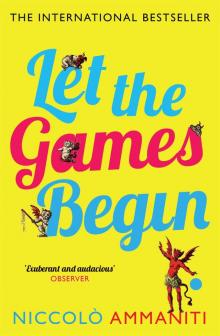 Let the Games Begin
Let the Games Begin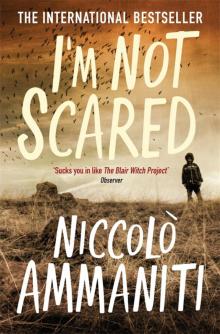 I'm Not Scared
I'm Not Scared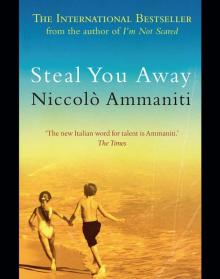 Steal You Away
Steal You Away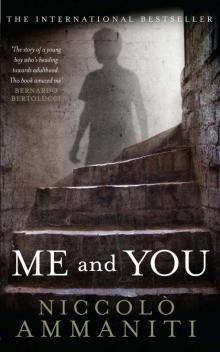 Me and You
Me and You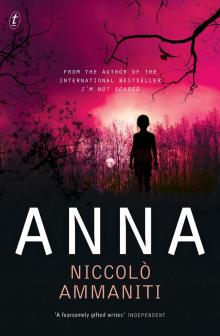 Anna
Anna